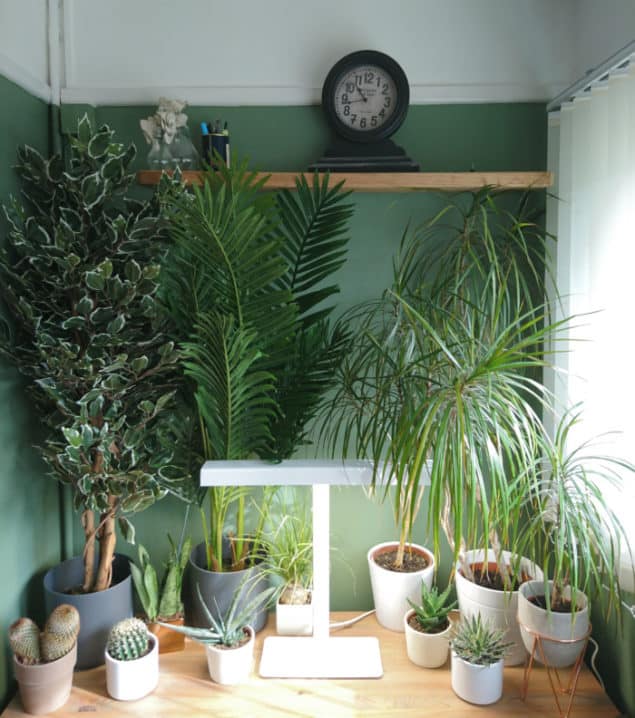
The past few days have felt decidedly warmer down here in Devon. We even had to turn the central heating down one evening as we were feeling a little balmy. To me, that is a sure sign that Spring is edging ever closer and I can’t wait. It’s hard trying to get through the winter months as those dark and dreary days seem endless. I really miss the warmer, sunny days that Spring and Summer bring and I find that this tends to affect my mood somewhat.
My husband is definitely affected. He can be a real grump in winter and tends to suffer from a distinct lack of motivation. I’m convinced that he suffers from seasonal affective disorder (SAD), but he assures me he doesn’t. After years of difficult winters, I decided that it was time we sought a solution that would help us cope better through the winter months and shake off those pesky winter blues.
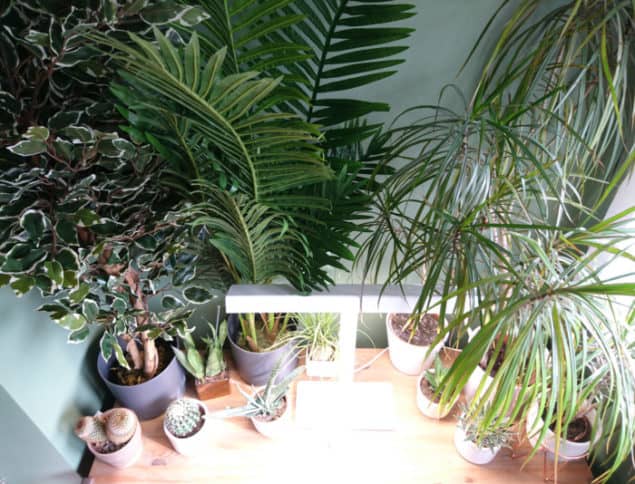
One thing that makes us both feel better is surrounding ourselves with greenery. In the past few years, we have made a real effort to bring more plants into our home. There is just something about living with plants that really lifts us. I’ve been trying to put my finger on why that is, but I’m not really sure. The colour green makes us both feel really good, which is why we decorated our living room in green (see our makeover here).
For me, it brings a sense of harmony and balance and makes me feel calm. Weirdly, when I asked my husband how green makes him feel, he said it makes him feel hungry, which was not really the answer I was expecting. But he couldn’t explain why it makes him feel good except for the fact that he grew up surrounded by forests and it makes him feel at home.
So adding more plants to our home seemed like a really good idea. The only challenge is keeping them alive as I’m not really very good at caring for them. At my last count, we have 18 plants in our living room alone, and most of these joined us this past autumn/winter season. I’m really hoping that I’ll be able to help them survive and thrive, but we’ll have to see how that goes.
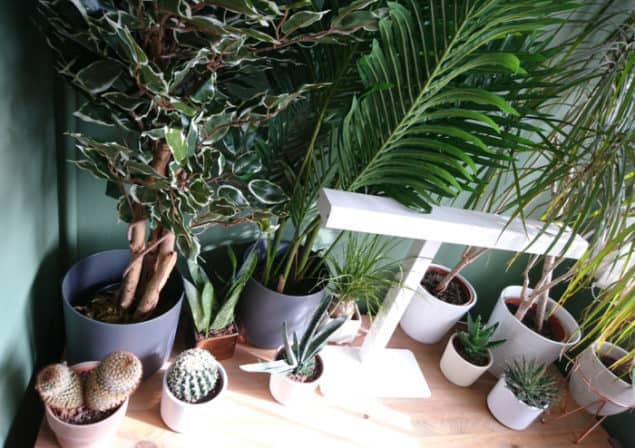
In these photos, you can see our little plant gang. I’ve tended to steer clear of plants that need a lot of care as I already know that I can’t offer the love and attention that they need. I have to have plants that thrive on neglect so I’ve chosen relatively easy plants like Dracena, cacti and succulents. And more recently, I’ve ventured into the arena of faux plants. Can you pick out the faux plants in these photos? I bet you can’t.
There was a time when artificial plants looked so fake. You could spot them a mile off as they looked really plastic and tacky. But faux plants have come a long way and the ones you can get today are really quite impressive. I got my two faux plants from Blooming Artificial who have a fantastic range of realistic artificial plants, flowers and trees.
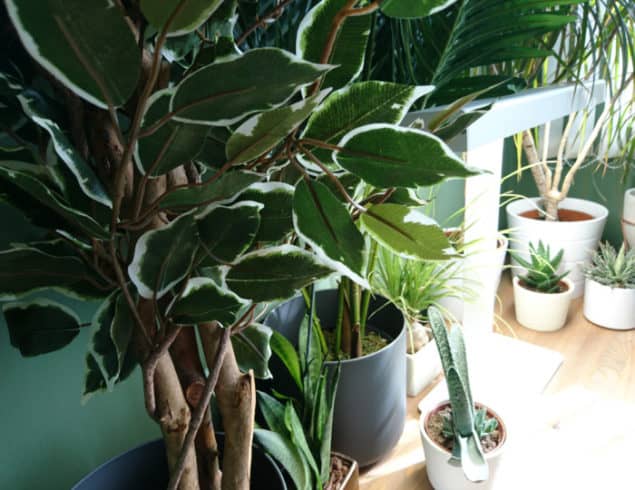
It’s actually the ficus tree and the paradise palm, both on the left, that are artificial. Don’t they look amazing? I certainly would not have known they weren’t real unless I really inspected them super close. The ficus tree even features a natural wood twisted stem which makes it look all the more authentic. The variegated leaves are really realistic and don’t look at all like those faux plants of yesteryear. If you look really closely you can see that the stems that the leaves are on are obviously plastic but this is the only giveaway.
The palm is almost indistinguishable from the real thing. You have to touch it to realise that it’s not real. I wasn’t sure whether I’d like faux plants or whether they would have the same effect as having real plants in the home, but I have to say I’ve been won over by Blooming Artificial. I do like mixing it up with real plants though, but if mine don’t survive, I’ll have no problem going fully faux.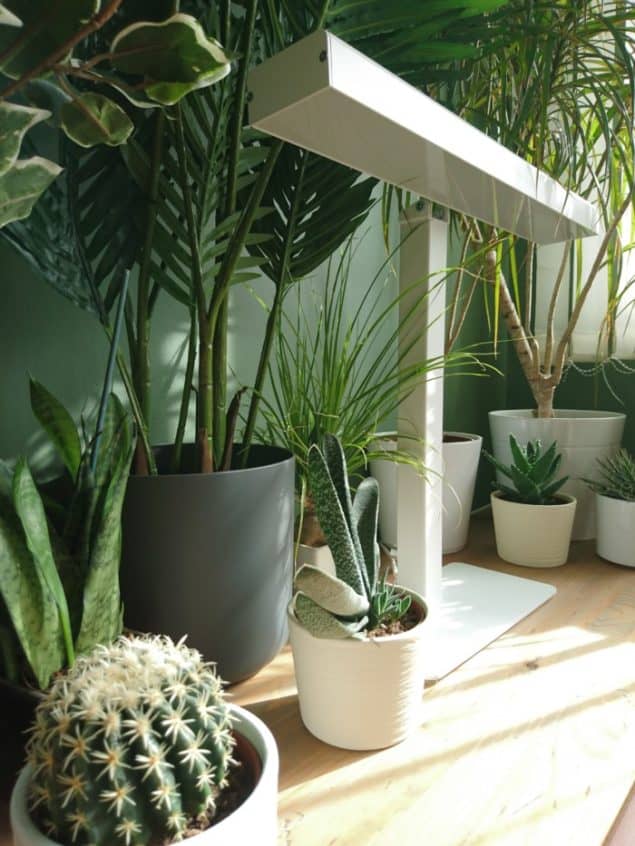
The other thing we’ve done this winter to combat the winter blues is to start using a SAD light from Innolux. As I said, I’ve been convinced for a few years now that my husband is affected by SAD, but it was only when we had the opportunity to own a SAD light that I really started to understand this disorder and its effects and I realised that I suffer from it mildly too. So what is SAD? Seasonal affective disorder (SAD) is a form of depression that people suffer from between September and April, triggered by the shortness of daylight hours. The NHS estimates that SAD affects approximately one in 15 people in the UK. That’s way higher than I thought.
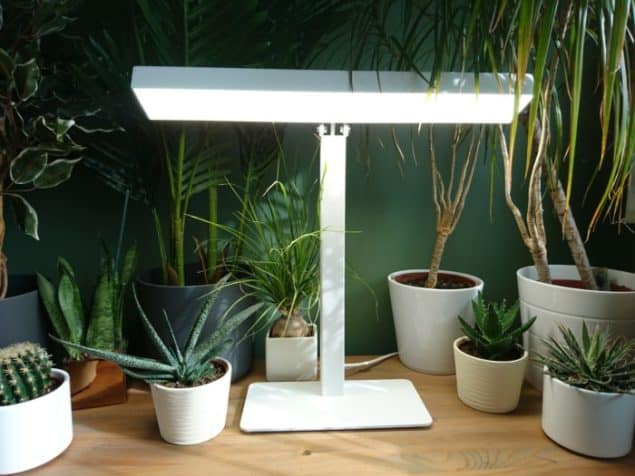
The lack of adequate sunlight in winter has a profound effect on our bodies, especially when it comes to melatonin production. Melatonin is a hormone produced by the pineal gland and it is responsible for regulating the body’s circadian rhythm. It is like a natural sleeping pill for the body and is produced at night to help us sleep. Daylight stops the production of melatonin, but with the darker mornings in winter, we often get up before it gets light and in this case, our bodies are still producing melatonin. Our body clocks then go out of sync, which affects the circadian rhythm.
The result is “winter blues” and there are some really serious side effects that accompany this disorder including lack of energy, daytime tiredness, social withdrawal, annoyance, sadness, craving for carbohydrates, and weight gain. I now recognise that a number of those symptoms affect me in winter.
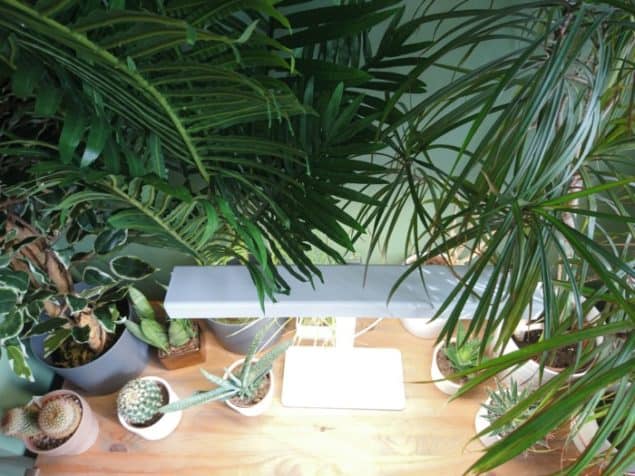
So how does a bright light device, like the one shown here, help to combat the symptoms of SAD and the milder version which is often called sub-syndromal SAD or sub-clinical SAD? Well, in short, a bright light device efficiently compensates for the lack of natural light in the dark season. On a normal summer’s day, the volume of sunlight is somewhere around 50,000-100,000 lux outdoors. (Lux is the international unit used to measure light).
In November, the volume of light can drop to 500 lux outdoors. Normal indoor lights produce 10-100 lux which is really nothing compared to our SAD lamp which is capable of emitting up to 10,000 lux. So by exposing yourself to a SAD light, you get the necessary light exposure to mitigate the effects of reduced daylight.
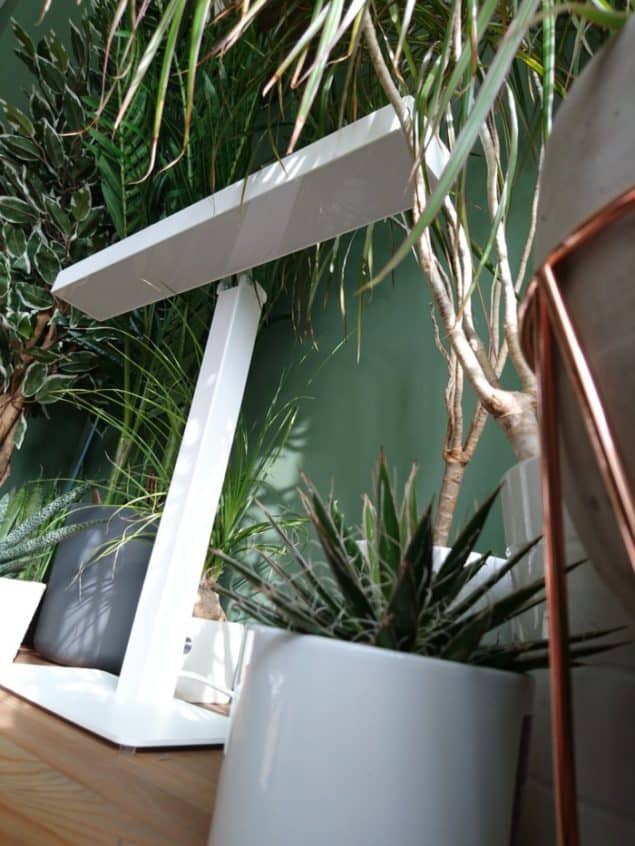
Bright light therapy is apparently most efficient in the morning right after waking, between 6 am and 10 am. It is recommended that you do it daily, starting with two hours a day. You need to place the light quite close to your face (approx 40cm-145cm, depending on the type of light you have), but there is no need to look directly at the light. It just has to stay in your line of vision.
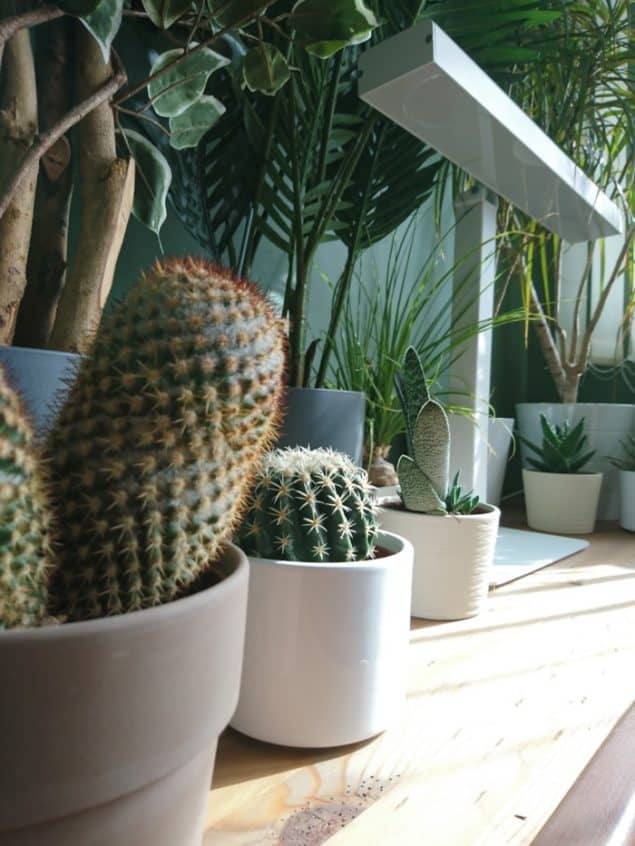
We have placed our light on our dining table. It’s where we all gather in the morning from 6 am onwards to have our breakfast. And anyone with toddlers will know that breakfast is not a quick affair so we probably get almost an hour of bright light therapy firth thing in the morning, which really helps to kickstart our day. I’ve certainly noticed a difference in the early morning mood at home. It used to be the case that we daren’t speak to my husband before he’d had his morning coffee and at least half an hour to come round. Now, he’s lovely and chatty within minutes of sitting in front of the lamp (we’ve positioned it closest to my husband for that exact reason).
It is such a lovely light, unlike any artificial light I’ve ever experienced before. It truly does mimic daylight and it really feels like the kind of light you get outside on a sunny day. It instantly lifts the mood and it’s hard not to feel happier when you bathe in the light. In fact, we like the light so much that we now only use this light at home. Even after we’re done with our light therapy session for the day we tend to keep the lamp on anyway as it creates such a nice atmosphere in the living room.
The good thing about this light, which is the Valovoima lamp designed by renowned Finnish designer Harri Koskinen, is that the head of the lamp is mobile so you can have it facing down or you can move it right up so that it shines right out into the room. You can also rotate it on its axis so that the head runs up and down the stand, perpendicular to the surface it stands on. So it is a great directional lamp and you have so much control over the light.
In addition, it also has a dimmer switch so you can regulate the amount of light that is being emitted. So once we’re done with our recommended light therapy session we tend to dim the light a little and keep it on so we get that sunny feeling all day long. I think it’s actually a little bit addictive if I’m honest.
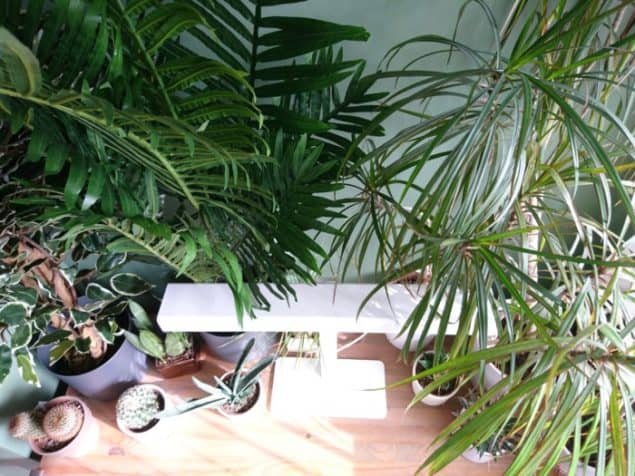
So that is how I’ve managed to get through this winter without suffering too badly from the dreaded ‘Winter Blues’. I wasn’t entirely sure whether plants and a SAD light would actually help our family feel happier and healthier but I’m totally bowled over by how much we’ve benefited. I’ve been recommending the SAD light to everyone I know because it really is a life changer.
When we started using it I thought I was attempting to help my husband deal with his symptoms of SAD and I hadn’t even realised that I too suffer mildly from this disorder. Perhaps I would never have known if it wasn’t for the light. I’m just so glad we have this in our lives now and I’m not dreading winter anymore like I always have done. I know it’s a bit late for this year now that spring is almost upon us but if anyone wants to invest in this SAD light in preparation for next year you can find it here. And don’t forget to check out the faux plants from Blooming Artifical too. They are really affordable so there is no excuse!
What about you guys, do you have any coping strategies for dealing with the winter blues? I’d love to hear your experiences so leave me a comment below!
Disclosure: This post has been written in collaboration with Blooming Artificial and Innolux who kindly supplied the products for the purpose of this review. This was done on the understanding that if I did not like them I would return them and wouldn’t feature them on the blog. All the opinions in this review are my own and I stress that I only collaborate with brands and companies that I genuinely like and believe that my readers will like too.

Plants are very good for the mood, even in winter, I like to take care of them and watch them grow. On the other hand, I think this style is very decorative, I have my kitchen full of plants, and some of them have really good smell (and taste!). Great post!
I really love this stuff. I am keen on indoor plants and my house has plenty of them. Is a very good idea. Congratulations, Stacey!
It looks amazing! I love the setup! I have a ficus too!
I think I get a bit of SAD, I certainly notice the difference now when the mornings and evenings are lighter. I should probably invest in one of these lamps. I try to have lots of plants around too, and take vitamin D in winter. I also found that embracing the darkness in a way helped, getting cosy with candlelight and nesting at home. Hopefully things will only get better now it’s nearly Spring x
OMG those SAD lamps are amazing and very clever. Gosh I hate the winter blues – sunlight is so important! Plants also really help but I end up killing them all so fake ones are best! haha :) xxx
Innolux do some really good looking SAD lights Arianna. Definitely worth checking out! Glad I’m not alone when it comes to killing plants!
I definitely know a few people who suffer from SAD! Nice to know that it’s being acknowledged though with new products. I wonder whether it’s legit enough for photography in the darker months too! Great plant collection hun. My hubby is putting a stop to any more in this house. I’m killing too many haha x
Yes Karen, using a SAD lamp definitely helps with photography during the darker winter months!
I think I need to get one of those SAD lamps! I have definitely been feeling the lack of sunlight recently. I wonder if your plants are benefiting too?
I was wondering if the light would help the plants Carole. I think I might give it a go. Especially for my tiny cacti that are on a shelf on the wall. They probably don’t get as much light as they should.
So first off – what an amazing plant gang! I would have never spotted the fauxs in there. I really must check out Blooming Artificial. We’re going to be doing up our cellar soon and I want some plant life in there but being a basement, it doesn’t get much light so faux is definitely something I’m considering! Second, I definitely suffer from SAD and I’ve considered getting a light like that for a while. It’s good to know you have lived with it for a while and feel they are a good investment. Will have to think about one for next winter I think! xx
I definitely recommend getting a light Kimberley, even if you don’t suffer badly. It’s hard to explain how it makes you happier but it just does.
I keep killing my plants :( which is so mean when you know how kind they are to us. Love the smart light -much cooler than other sad lamps I’ve seen.
Innolux do loads of light therapy lights that don’t look like light therapy lights. They do floor lamps and pendant lights too. Definitely worth a look.